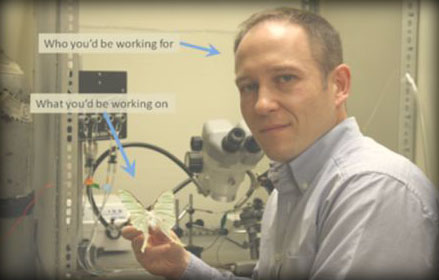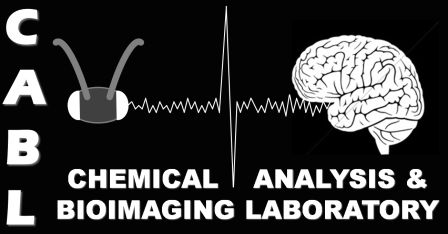So you're interested in research?
I'm always looking for new blood in the Hillier lab, and there is an array of research projects on insect behaviour, neuroscience, physiology and pest management. This includes subjects suitable for investigation as: (1) Research Topics courses, (2) more in-depth studies at the Undergraduate Honours and Graduate Level , or (3) opportunities for Post-Doctoral Training

Research Topics
Biology 3413 is a specialized course of study in which undergraduate biology students work directly with a faculty member, engaged in an aspect of their research program. This can be an appropriate course of study for individuals who want a taste of life in a research laboratory, or can often provide a head-start for development of an honours thesis. I am currently acting as coordinator for this course, which culminates with a research poster mini-symposium for students to present their research before their peers, faculty and the Acadia Community at-large. I accept a limited number of research topics each year to engage in projects typically involving histology, immunohistochemistry, 3-D brain reconstruction, or analysis of insect behaviour. More information and a sample of my personal course syllabus are found here.
Honours
The Department of Biology at Acadia University maintains a strong history of research engaging undergraduate Biology honours students. Students select a faculty mentor with whom to conduct their research during the summer months and continuing throughout the year (students typically contact potential supervisors directly to discuss potential projects and funding options). This happens most frequently in a student’s third year of study, but may be an option in earlier years as well. When to contact? Earlier is better, and it is worth contacting more than one potential supervisor to consider the best match for your career interests (you are, after all, going to be working on this for almost a year!). I recommend students try to express honours aspirations by November, and certainly before the Christmas break, as funding deadlines approach rapidly in the New Year
Funding is key to the Honours program, generally providing 16 weeks of paid research salary during summer months. Students participate in a comprehensive exam in the Fall, which tests general biology concepts. This is followed by a departmental Honours symposium, Biofeedback, in which all Honours students present their research findings (usually the week before spring break). Finally students submit and defend a high-quality thesis in March.
In comparison to simply engaging in a Research Topics course, the Honours option is significantly more engaging and substantial. Students have sufficient time to acquire numerous technical skills and often produce high-quality peer-reviewed publications. In the Hillier lab, students will have opportunities to garner a variety of skills: electrophysiology (including Electroantennography, Extracellular single-unit recording, and Intracellular sharp electrode recording), histology, immunohistochemistry, and live-cell fluorescent imaging. Other options include field based investigations, particularly focused on insect pests and pollinators important for Nova Scotia agriculture.
Graduate Opportunities
I am always seeking new students at the Graduate level. Most commonly, this research would be conducted as a 2 year Masters program through Acadia University. Other options exist to pursue PhD-level research via collaborations with other regional institutions (contact me directly for more information)
Skills and techniques acquired within the Hillier lab would be complementary to a range of undergraduate experience and career aspirations. Our lab maintains research across the breadth of animal-environmental communication; therefore applicants are welcome with aspirations ranging from agricultural, forestry or ecological in focus, to behavioural examinations of invertebrate behaviour to biomedical approaches examining physiology and neuroscience.
Students which have already secured funding for graduate study will obviously be in a better situation to commit to a program of study in the Hillier lab (or anywhere, for that matter!). My lab's research can support several lines of research funding, including industry sources (such as NSERC Industrial Postgraduate Scholarships or Nova Scotia Department of Agriculture), Acadia University Teaching assistantships, or research organizations such as NSERC Postgraduate Scholarships, CIHR Masters or PhD Awards, or NSHRF Student Research Awards. I also have existing funding for selected lines of research and can provide suggestions on additional funding options.
February 1 is the generalized deadline for application to Graduate Studies at Acadia (for consideration of teaching assistantships). Individuals who have existing funding may have flexibility in admission periods, and those without established funding should contact me well in advance, so we can discuss support options. I have research funding from a variety of sources, including NSERC, though this is limited usually inadequate to support all of the students who apply for study within the lab. Therefore, it is useful to begin inquiry of graduate studies well in advance (i.e. up to one year) so that you have good options for funding, and we can sort out a research project which sparks your interest.
Post-Doctoral Opportunities
Post-doctoral research in the Hillier lab can provide an array of new skills to a PhD-experienced graduate seeking some novel neuroscience, behavioural, or field techniques, along with the opportunity to work in a dynamic lab environment in a great little University town, Wolfville, Nova Scotia. The ideal post-doctoral applicant will work as a trainee and a colleague, directly supervising student lab research, assisting in experimental design, and will have opportunities to apply for independent funding.
Funded post-doc opportunities will be posted on this website, when available.




